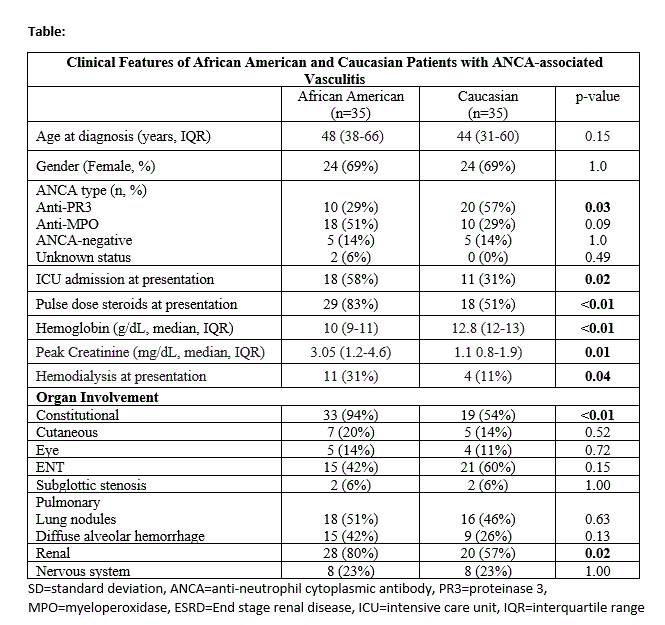Session Information
Session Type: Poster Session C
Session Time: 9:00AM-11:00AM
Background/Purpose: ANCA-associated vasculitis (AAV) comprises a group of disorders characterized by inflammation of small and medium-sized arteries. Prevalence and phenotype of these diseases appear to vary across geographic and racial subgroups and information pertaining to the African American population is sparse. The objective of this study was to characterize clinical features in a cohort of African American patients with AAV compared to a matched cohort of Caucasian patients with AAV.
Methods: A retrospective electronic chart review was performed from 2007-2019 to identify patients with AAV within a single hospital network. African American and Caucasian patients were matched based on age and gender. Differences in clinical characteristics between the two groups were assessed by the Chi-square test for categorical variables and Mann-Whitney test for continuous variables, as appropriate.
Results: Thirty-five African American patients and 35 Caucasian patients with AAV were identified. Median age at diagnosis was 48 years (IQR 38-66) in the African American group, and 44 years (IQR 31-60) in Caucasian group; p=0.15. Twenty-four (69%) patients in each group were female; p=1.0. At time of presentation, African-American patients with AAV more frequently required admission to the Intensive Care Unit (58% versus 31%, p=0.02), received pulse dose steroids (83% versus 51%, p< 0.01), had lower hemoglobin values (median 10 g/dL versus 12.8 g/dL, p< 0.01), and higher creatinine levels (3.05 mg/dL versus 1.1 mg/dL, p=0.01) compared to Caucasian patients with AAV. African American patients with AAV also more frequently had renal involvement (80% versus 57%, p=0.02) and required hemodialysis at presentation (31% versus 11%, p=0.04), compared to Caucasian patients with AAV. There was a higher frequency of PR3-ANCA positivity in the Caucasian patient population (57% versus 29%, p=0.03) and a trend towards African American patients having a higher frequency of MPO-ANCA, although this did not reach statistical significance. There were no statistically significant differences in cutaneous manifestations, eye involvement, ENT involvement, subglottic stenosis, lung nodules or diffuse alveolar hemorrhage, or nervous system involvement between the two groups (TABLE).
Conclusion: African American patients with AAV had more severe disease at time of initial presentation, as demonstrated by more frequent Intensive Care Unit admissions, more frequent administration of pulse dose steroids, higher creatinine, and increased need for hemodialysis, when compared to the group of Caucasian patients with AAV. The observed differences in disease severity are likely multifactorial with potential causes including heterogeneity of vasculitis presentation amongst different racial subgroups, comorbid conditions, access to care, treatment differences, environmental and socioeconomic factors. Additional studies to further delineate these factors are needed.
 Clinical Features of African American and Caucasian Patients with ANCA-associated Vasculitis
Clinical Features of African American and Caucasian Patients with ANCA-associated Vasculitis
To cite this abstract in AMA style:
Khawaja S, Godbole S, Kimoto M, Steen V, Quinn K. Characterization of ANCA-Associated Vasculitis Among African American Patients [abstract]. Arthritis Rheumatol. 2020; 72 (suppl 10). https://acrabstracts.org/abstract/characterization-of-anca-associated-vasculitis-among-african-american-patients/. Accessed .« Back to ACR Convergence 2020
ACR Meeting Abstracts - https://acrabstracts.org/abstract/characterization-of-anca-associated-vasculitis-among-african-american-patients/
